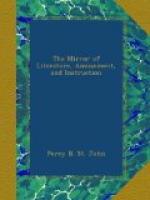* * * * *
PARLIAMENT.
(For the Mirror.)
The following particulars, which have been gleaned from several sources, relating to the British Parliament, may be acceptable at the present time, when the English people are in hopes of a renovation of that Constitution which has been, and will still continue to be, the admiration of the civilized world:—The word Parliament was first used in 1265; and the Commons were admitted at this time, though not regularly represented. The parliament called at Shrewsbury, in 1283, by Edward I., was the first to which cities and towns were summoned to send representatives. It was also the first that granted aids towards the national defence of the three denominations of knights, citizens, and burgesses, as well as by the lords spiritual and temporal. In this parliament the representatives sat in a separate chamber from the barons and knights. The Commons consisted of two knights for each county, two representatives for the city of London, and two for each of the following twenty towns only:—
Winchester, Newcastle-upon-Tyne, York, Bristol, Exeter, Lincoln, Canterbury, Carlisle, Norwich, Northampton, Nottingham, Scarborough, Grimsby, Lynn, Colchester, Yarmouth, Hereford, Chester, Shrewsbury, Worcester.
From this it appears that there were not representatives of any towns in the counties of
Westmoreland, Lancaster, Derby, Durham, Stafford, Warwick, Leicester, Rutland, Suffolk, Hertford, Bedford, Cambridge, Huntingdon, Buckingham, Berks, Oxford, Wilts, Somerset, Gloucester, Dorset, Sussex, Surrey.
In after times, burghs that were summoned frequently prayed the Crown to be excused from sending representatives, on the account of their being compelled to pay 3s. 4d. a day to each member for his maintenance, while attending in his place; yet the allowance was made on a plan so strictly economical, that the knights of Berkshire were only allowed for six days, those for Bedfordshire for only five days, and those for Cornwall for only eleven days, when called to a parliament at York. Sheriffs, in their write for elections to parliament, sometimes omitted one or more burghs in a county, and at other times sent writs to the same burghs—and this, for aught known to the contrary, without instruction from the king or his council. Where burghs were poor, there were many such omissions, by favour of the sheriff, for a space of nearly three hundred years. Upon petition of the town of Torrington to Edward III., in 1366, he directed a letter to the bailiff and good men of the town, excusing them “from the burden of sending two representatives to parliament, as they had never been obliged so to do till the 24th of his reign, when,” says the king, “the sheriffs of Devonshire maliciously summoned them to send two members to parliament.”




